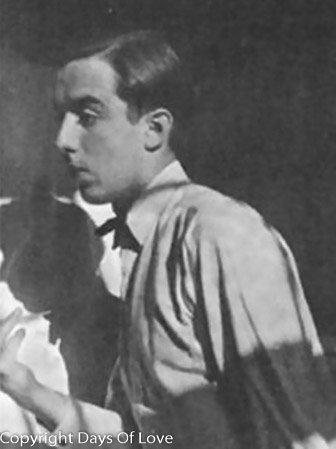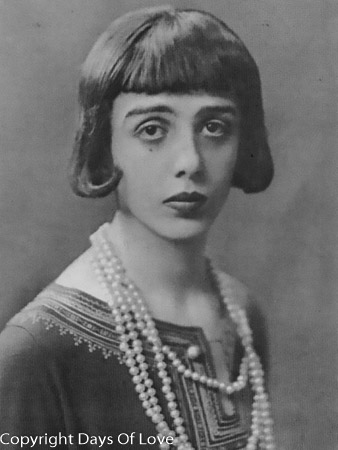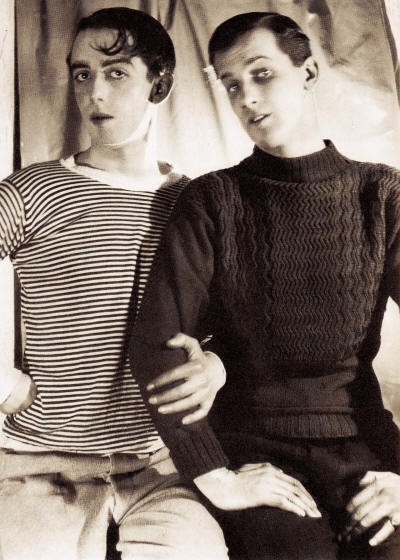

Partner Toni Altmann, Sandy Baird, Sam Langford, buried together
Queer Places:
Eton College, Windsor SL4 6DW, Regno Unito
University of Oxford, Oxford, Oxfordshire OX1 3PA
Chemin du Col de Bast, 06100 Nice, Francia
Cimetière de Caucade, 7 Place Caucade, 06200 Nice, Francia
 Brian
Christian de Claiborne Howard (13 March 1905 – 15 January 1958) was an English
poet and later a writer for the New Statesman. He was a member of the Hypocrites'
Club. At Oxford, Brian Howard and his friends were known as Hearts, mostly sons of noblemen and aspiring writers. The Isis Magazine wrote "They are rather alarming. They have succeeded in picking up a whole series of intellectual catch-phrases with which they proceed to dazzle their friends and frighten their acquaintances: and they are the only people I have ever met who have reduced rudeness to a fine art."[18] Sir John Betjeman tells the story of a Balliol aesthete called Michael Dugdale who used to walk into Brasenose College, dominated by the Hearts, with a stick and limping, in the hope that the Hearts would be too sporting to attack him.[19]
Brian
Christian de Claiborne Howard (13 March 1905 – 15 January 1958) was an English
poet and later a writer for the New Statesman. He was a member of the Hypocrites'
Club. At Oxford, Brian Howard and his friends were known as Hearts, mostly sons of noblemen and aspiring writers. The Isis Magazine wrote "They are rather alarming. They have succeeded in picking up a whole series of intellectual catch-phrases with which they proceed to dazzle their friends and frighten their acquaintances: and they are the only people I have ever met who have reduced rudeness to a fine art."[18] Sir John Betjeman tells the story of a Balliol aesthete called Michael Dugdale who used to walk into Brasenose College, dominated by the Hearts, with a stick and limping, in the hope that the Hearts would be too sporting to attack him.[19]
Howard is credited with coining the phrase, “Anybody over the age of 30 seen in a bus has been a failure in life,” often wrongly attributed to Margaret Thatcher. According to Daily Telegraph correspondent and historian, Hugo Vickers, (writing in November 2006), the author was Brian Howard. The phrase came into wider use when used by Loelia, Duchess of Westminster, in her memoir Grace and Favour (1961).
Howard was born to American parents in Hascombe, Surrey, of Jewish descent, and brought up in London; his father Francis Gassaway Howard - son of the writer Frank Gassaway, known as 'Derrick Dodd'[2]- was an associate of James Abbott McNeill Whistler.
He was educated at Eton College, where he was one of the Eton Arts Society group including Harold Acton, Oliver Messel, Anthony Powell and Henry Yorke. He entered Christ Church, Oxford in 1923, not without difficulty. He was prominent in the group later known as the Oxford Wits. He was part of the Hypocrites' Club that included Harold Acton, Lord David Cecil, L. P. Hartley and Evelyn Waugh.



Railway Club at Oxford, conceived by John Sutro, dominated by Harold Acton. (Left to right) Back: Henry Yorke, Roy Harrod, Henry Weymouth, David Plunket Greene, Harry Stavordale, Brian Howard. Middle row: Michael Rosse, John Sutro, Hugh Lygon, Harold Acton, Bryan Guinness, Patrick Balfour, Mark Ogilvie-Grant, Johnny Drury-Lowe. Front: porters.
At Oxford Howard was part of the Railway Club, which included: Henry Yorke, Roy Harrod, Henry Thynne, 6th Marquess of Bath, David Plunket Greene, Edward Henry Charles James Fox-Strangways, 7th Earl of Ilchester, Brian Howard, Michael Parsons, 6th Earl of Rosse, John Sutro, Hugh Lygon, Harold Acton, Bryan Guinness, 2nd Baron Moyne, Patrick Balfour, 3rd Baron Kinross, Mark Ogilvie-Grant, John Drury-Lowe.[3]
It has been suggested[4] that Howard was Waugh's model for Anthony Blanche in Brideshead Revisited. But Waugh wrote, to Lord Baldwin, "There is an aesthetic bugger who sometimes turns up in my novels under various names—that was 2/3 Brian [Howard] and 1/3 Harold Acton. People think it was all Harold, who is a much sweeter and saner man [than Howard]."[5]
At this time he had already been published as a poet, in A. R. Orage's The New Age, and the final Sitwell Wheels anthology. He used the pseudonyms "Jasper Proude" and "Charles Orange." His verse also was in Oxford Poetry 1924. His poetry was admired and promoted by Edith Sitwell in the late 1920s.
In the late 1920s, he was a key figure among London's "Bright Young Things"—a privileged, fashionable and bohemian set of relentless party-goers, satirised in such novels as Evelyn Waugh's 1930 Vile Bodies where the character of Miles Malpractice owes something to Howard. Apart from Waugh, Howard knew all this circle, including Nancy Mitford, Henry Yorke, Harold Acton, and especially Nancy Cunard with whom he shared artistic and political interests, maintaining contact throughout his life.
In 1929 he was famously involved in the "Bruno Hat" hoax when the fashionable Hon Mr. & Mrs. Bryan Guinness promoted a spoof London art exhibition by an apparently unknown German painter Bruno Hat (impersonated by the German-speaking Tom Mitford, brother of Nancy and Diana Mitford—the latter at the time Mrs. Guinness, a socialite, arts' patron and friend of Howard, Lytton Strachey, Evelyn Waugh, Boris Anrep, Dora Carrington, John Betjeman and other artistic and literary figures, before her second marriage to British fascist leader Sir Oswald Mosley). Bruno Hat's paintings were the work of Brian Howard.
F. Scott Fitzgerald was furious when, in May 1929, Dolly Wilde made a pass at Zelda Fitzgerald. More often, with heterosexual men, she was something of a cock-tease. According to her cousin Vyvyan Holland, Oscar Wilde’s son, ‘she was always taking her horse to the water and then refusing to let him drink’. The men who were more at ease with her sense of fun tended to be homosexual. She was a member of Stephen Tennant’s circle and went to Brian Howard’s famous Greek party dressed as Sappho.
Howard led a very active social life, tried to come to terms with his homosexuality, and published only one substantial poetry collection God Save the King (1930, Hours Press). He was active as a poet during the Spanish Civil War, but did not ultimately invest in his work with seriousness. He drank heavily and used drugs.
Jean Connolly moved in an entourage of young male couples that included Dwight Ripley and Rupert Barneby, Tony Bower and Cuthbert Worsley, Peter Watson and Denham Fouts, Brian Howard and Toni Altmann. "Drink, night life, tarts and Tonys," complained Cyril Connolly, who referred to the whole entourage as "Pansyhalla." They liked Picasso, Marcel Proust, and Francis Poulenc, favored in architecture the Baroque, admired Josephine Baker and jazz. Someone took a copy of Dwight Ripley's Poems to Jean Cocteau, who responded "Quel néurophate!", a diagnosis that Rupert relayed with wicked relish. When Gerald Heard published two books in 1931 to propose that evolution demanded an evolved human consciousness, Brian Howard called them "the most important that have ever been written since the Ice Age." In Pansyhalla, a compelling example was set by Peter Watson, who joined with Cyril Connolly in 1939 to found Horizon and then financed that influential journal thoughout its career. Until the WWII, Watson lived mostly in Paris; a portrait of Jean Connolly, by Man Ray, was in his apartment. In 1938 he subsized the publication of a first book of poems by Charles Henri Ford, the young poet who was painter Pavel Tchelitchew's lover, and who, back in New York by 1940, would found a counterpart to Horizon, the trendier but likewise influential magazine View. It was View that brought John Bernard Myers from Buffalo to be its managing editor, and Myers who, as director of the Tibor de Nagy Gallery that Dwight himself sponsored, acted as impresario for a cast of painters and poets that seems now, to typify the postwar New York scene.
In 1940, during the autumn height of the Blitz, Stephen Spender published an open letter to Christopher Isherwood in the New Statesman. "You can't escape," wrote Spender. "If you try to do so, you are simply putting the clock back for yourself: using your freedom of movement to enable yourself to live still in pre-Munich England." Isherwood, who left long before the Blitz, was annoyed. So was Dwight Ripley. "It takes in all of us refugees," he complained to Rupert Barneby, while implying that there was more than politics at issue. "I shall always think of the Spenders henceforth as Delight and Inez, How bitter they are, and no wonder." Earlier, Spender in fact urged Isherwood to emigrate to America in search of refuge for his German lover, Heinz Neddermeyer. In Dwight's circle of friends, Brian Howard likewise had a German lover, Toni Altmann. After Hitler was named chancellor, Isherwood spent the next four years, Howard the next seven, each contending with a sucession of revoked visas, expired passports, and sudden deportations in their continuing efforts to find asylum or new citizenship for Neddermeyer and Altmann, respectively, and so prevent their eventual repatriation and arrest in Germany. Both Englishmen tried to get their lovers into England, and both were refused on moral grounds. Erika Mann married W.H. Auden and became a British subject overnight. When Neddermeyer was arrested in Paris, it was Tony Bower who went to rescue him. Isherwood joined them in Luxembourg, but from there Neddermeyer was expelled into Germany, where he was arrested, charged with reciprocal onanism ("in fourteen foreign countries and in the German Reich," remembered Isherwood), found guilty, and sentenced to successive terms in prison, at hard labor, and in the army. Brian Howard's efforts on behalf of Toni Altmann were likewise frustrated at the end. Howard was an early and outspoken antifascist, the first Englishman to understand the Nazi threat, claimed Erika Mann, who, when asked to describe his plans for returning to serve England, had responded in language of persuasive spontaneity: "So, really, I have no plans, except to do my best for Toni." Altmann was interned by the French in Toulon in September 1939, then moved to Le Mans, where Howard lost track of him. Howard remained in France trying to locate his lover until, in June the following year, he escaped on a coal freighter that departed Cannes the day before the Germans arrived in Marseilles.
In 1942 Toni Altmann escaped his internment in France and reached the United States, where he married in order to become an American citizen. Howard, who was informed of the marriage by postcard, applied soon after to the Royal Air Force; he spent much of the was in uniform, though his unit never left England.
During World War II Howard took part in the Dunkirk evacuation and later worked for MI5 but was dismissed from the War Office in June 1942, after which he was conscripted to the Royal Air Force and given a low-level clerk's job at Bomber Command, High Wycombe. An Air Ministry note on his file says he should never be given a commission. Transferred to another posting, where he referred to his commanding officer as "Colonel Cutie" (an appellation Evelyn Waugh gave his rebellious rogue Basil Seal in the novel Put Out More Flags), Howard was dismissed in December 1944, by which time he had formed a longstanding open relationship with Sam, an Irishman serving in the Air Sea Rescue.
Howard had a long affair with Sandy Baird that he knew from Eton. Baird was killed in action in 1943 at 33 years old.[6]
After the war, Howard drifted around Europe with Sam Langford, continuing to write occasional articles and reviews for the New Statesman, the BBC and others, fitfully working on an uncompleted biography of the gay English writer Norman Douglas (author of the novel South Wind) and doing no substantial work. Indiscreetly promiscuous, drinking heavily, taking drugs and behaving outrageously, they were expelled in turn from Monaco, France, Italy and Spain, the French authorities noting their "moralité douteuse" (dubious morality).
Not surprisingly, he suffered from bad health in the 1950s, and committed suicide by taking an overdose of sedatives after the accidental death of his lover, Sam Langford, an American man, who died suddenly but naturally in Howard's bath.[7][8] They were buried alongside each other at Russian Orthodox Cemetery, Nice.
Evelyn Waugh wrote: "I used to know Brian Howard well—a dazzling young man to my innocent eyes. In later life he became very dangerous—constantly attacking people with his fists in public places—so I kept clear of him. He was consumptive but the immediate cause of his death was a broken heart."[5]
My published books: